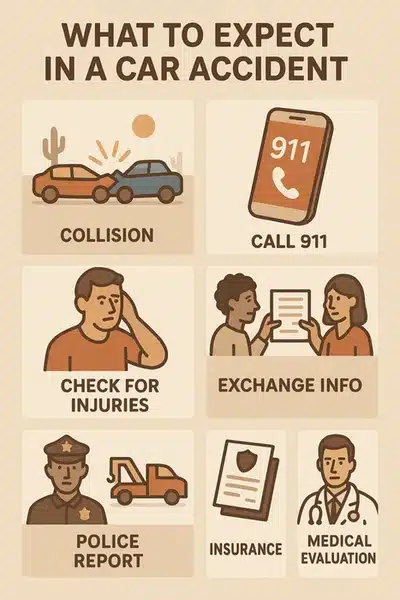What to Expect After a Car Accident in Arizona
Car accidents happen in an instant but their effects can last for months or even years. In Arizona, with its unique laws and insurance requirements, knowing what to expect after a collision can make a significant difference in protecting your rights and ensuring proper compensation. This guide walks you through the entire process—from the moment of impact through insurance claims and potential legal proceedings.
The Immediate Aftermath: First Steps at the Accident Scene
When a collision occurs on Arizona roads, taking proper steps immediately can protect both your safety and your legal rights.
Safety First
Arizona law requires drivers to:
- Stop immediately at the scene or as close as possible
- Move vehicles out of traffic if possible (Arizona’s “Quick Clearance Law”)
- Check for injuries and call 911 if anyone is hurt
Documentation Requirements
According to the Arizona Department of Transportation, you should:
- Exchange information with other drivers (names, addresses, phone numbers, license plate numbers, and insurance information)
- Collect contact information from witnesses
- Take photos of vehicle damage, the accident scene, road conditions, and visible injuries
- Note the time, weather conditions, and any relevant traffic signals
Police Reports
A recent Arizona Republic article highlighted common misconceptions about police reports. While Arizona law only requires reporting accidents involving injuries or deaths, or property damage exceeding $2,000, having an official police report can be invaluable for insurance claims and potential litigation.
Police reports provide an objective account of the accident and often include the officer’s determination of fault—information insurance companies heavily rely on when processing claims.
Medical Considerations: The Hidden Dangers
Delayed Symptoms
Many car accident victims experience delayed onset of symptoms. According to specialists at GLG Arizona’s injury assessment center, symptoms like neck pain, headaches, and back discomfort may not appear for 24-72 hours after an accident.
Importance of Immediate Medical Attention
Even if you feel fine initially, seeking medical attention promptly accomplishes two crucial purposes:
- It identifies injuries before they worsen
- It creates a medical record linking your injuries to the accident
A Tucson Daily Star report noted that insurance companies frequently challenge claims for injuries when victims delay seeking treatment, arguing that the injuries either weren’t serious or weren’t caused by the accident.
Follow-up Care
Consistent follow-up medical care serves as crucial documentation of your injuries and recovery process. The medical documentation specialists at GLG Arizona’s medical evidence center emphasize maintaining a complete record of:
- All doctor visits and treatments
- Medication prescriptions and usage
- Physical therapy sessions
- Work restrictions or limitations
- Impact on daily activities
Understanding Arizona’s Unique Insurance Laws
Fault-Based System
Arizona operates under a “fault” insurance system, meaning the driver responsible for causing an accident is also responsible for paying resulting damages.
Minimum Insurance Requirements
The Arizona Department of Insurance and Financial Institutions mandates that all drivers maintain minimum liability coverage of:
- $25,000 for bodily injury to one person
- $50,000 for bodily injury to two or more people
- $15,000 for property damage
Comparative Negligence
Arizona follows a “pure comparative negligence” rule, allowing accident victims to recover damages even if they were partially at fault. However, compensation is reduced by the percentage of their responsibility.
For example, if you are found 20% responsible for an accident with $10,000 in damages, you would be eligible to recover $8,000 (the total minus your 20% fault).
The Insurance Claims Process in Arizona
Filing Your Claim
After an accident, you should:
- Notify your insurance company promptly (most policies require reporting within 24-72 hours)
- Provide basic accident information and cooperate with the investigation
- Be cautious about giving recorded statements without legal advice
- Never admit fault
Common Insurance Company Tactics
According to GLG Arizona’s insurance tactics guide, Arizona accident victims should be aware of common insurance strategies:
- Quick Settlement Offers: Initial offers are often significantly lower than what your claim is worth, especially before the full extent of injuries is known
- Recorded Statement Requests: Statements can be used against you later to minimize or deny your claim
- Medical Authorization Requests: Broad authorizations may allow access to unrelated medical history to find pre-existing conditions
- Claim Delays: Extended processing times pressure claimants to accept lower offers
Legal Timeframes and Considerations
Statute of Limitations
In Arizona, you generally have two years from the date of the accident to file a personal injury lawsuit. Missing this deadline typically means permanently losing your right to seek compensation through the courts.
According to the Arizona Judicial Branch, special circumstances can extend or shorten this period:
- For minors, the two-year period usually begins when they turn 18
- Claims against government entities have shorter notice requirements (180 days)
- Discovery rules may apply if injuries weren’t immediately apparent
Compensation Available After Arizona Car Accidents
Economic Damages
These cover quantifiable financial losses:
- Medical expenses (past and future)
- Lost wages and diminished earning capacity
- Property damage
- Rehabilitation costs
Non-Economic Damages
Arizona places no caps on non-economic damages, which include:
- Pain and suffering
- Emotional distress
- Loss of enjoyment of life
- Disfigurement
Real-World Examples: Arizona Accident Outcomes
Case Study: Hidden Injuries in Phoenix
A Phoenix resident initially felt only mild discomfort after a rear-end collision. Assuming she was merely “shaken up,” she declined medical attention at the scene. Three days later, she developed severe neck pain and headaches, eventually diagnosed as whiplash and a mild concussion. By documenting her symptoms immediately when they appeared and maintaining consistent medical care, she was able to successfully link her injuries to the accident despite the delayed onset.
Case Study: Comparative Negligence in Tucson
In a Tucson intersection accident, both drivers were found partially at fault—the plaintiff for exceeding the speed limit and the defendant for failing to yield. Though the plaintiff was determined to be 30% responsible, they were still able to recover 70% of their damages under Arizona’s comparative negligence rules.
When to Seek Legal Representation
Not every accident requires an attorney, but certain situations strongly warrant legal counsel:
- Serious injuries or long-term medical conditions
- Disputed liability
- Multiple parties involved
- Insurance company denials or unreasonable offers
- Complex medical issues or pre-existing conditions
The attorneys at GLG Arizona’s car accident center recommend consulting with a legal professional whenever you’re uncertain about the value of your claim or face challenges in the compensation process.
Post-Accident Mental Health Considerations
The psychological impact of car accidents is often overlooked but can be substantial. According to a recent Phoenix Mental Health Coalition report, up to 40% of accident victims experience some form of post-traumatic stress, anxiety, or depression.
Recovery resources include:
- Mental health counseling (often covered by medical payments coverage)
- Support groups
- Trauma-focused cognitive behavioral therapy
Preparing for the Unexpected: Pre-Accident Readiness
Being prepared before an accident occurs can significantly improve outcomes:
- Review your insurance coverage regularly (consider limits higher than minimum requirements)
- Keep an accident kit in your vehicle (including a documentation form, pen, flashlight, and emergency contacts)
- Install a dashcam to provide objective evidence
- Store insurance and registration information where it’s easily accessible
Conclusion: Moving Forward After an Arizona Car Accident
Car accidents create physical, emotional, and financial challenges, but understanding what to expect can help you navigate the aftermath more effectively. By following proper procedures at the scene, seeking appropriate medical care, understanding your rights under Arizona law, and consulting with experienced professionals when needed, you can protect your interests and focus on recovery.
If you’ve been involved in an Arizona car accident, remember that time-sensitive elements require prompt attention. From reporting the accident and seeking medical care to filing insurance claims and preserving evidence, taking timely action is crucial to securing the compensation you deserve.



